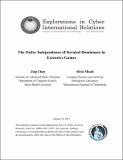| dc.contributor.author | Chen, Jing | |
| dc.contributor.author | Micali, Silvio | |
| dc.date.accessioned | 2022-04-06T15:06:15Z | |
| dc.date.available | 2022-04-06T15:06:15Z | |
| dc.date.issued | 2013-01-22 | |
| dc.identifier.uri | https://doi.org/10.3982/TE942 | |
| dc.identifier.uri | https://hdl.handle.net/1721.1/141702 | |
| dc.description.abstract | Shimoji and Watson (1998) prove that a strategy of an extensive game is rationalizable in the sense of Pearce if and only if it survives the maximal elimination of conditionally dominated strategies. Briefly, this process iteratively eliminates conditionally dominated strategies according to a specific order, which is also the start of an order of elimination of weakly dominated strategies. Since the final set of possible payoff profiles, or terminal nodes, surviving iterated elimination of weakly dominated strategies may be order-dependent, one may suspect that the same holds for conditional dominance.
We prove that, although the sets of strategy profiles surviving two arbitrary elimination orders of conditional dominance may be very different from each other, they are equivalent in the following sense: for each player i and each pair of elimination orders, there exists a function φi mapping each strategy of i surviving the first order to a strategy of i surviving the second order, such that, for every strategy profile s surviving the first order, the profile (φi(si))i induces the same terminal node as s does.
To prove our results, we put forward a new notion of dominance and an elementary characterization of extensive-form rationalizability (EFR) that may be of independent interest. We also establish connections between EFR and other existing iterated dominance procedures, using our notion of dominance and our characterization of EFR. | en_US |
| dc.description.sponsorship | This material is based on work supported by the U.S. Office of Naval Research, Grant No. N00014-09-1-0597. Any opinions, findings, conclusions or recommendations therein are those of the author(s) and do not necessarily reflect the views of the Office of Naval Research. | en_US |
| dc.language.iso | en_US | en_US |
| dc.publisher | John Wiley & Sons, Inc./© Jing Chen, & Silvio Micali | en_US |
| dc.rights | Attribution-NonCommercial-NoDerivs 3.0 United States | * |
| dc.rights.uri | http://creativecommons.org/licenses/by-nc-nd/3.0/us/ | * |
| dc.title | The order independence of iterated dominance in extensive games | en_US |
| dc.type | Article | en_US |
| dc.identifier.citation | Chen, J., & Micali, S. (2013). The order independence of iterated dominance in extensive games. Theoretical Economics, 8(1), 125–163. | en_US |
| dc.eprint.version | Final published version. | en_US |
